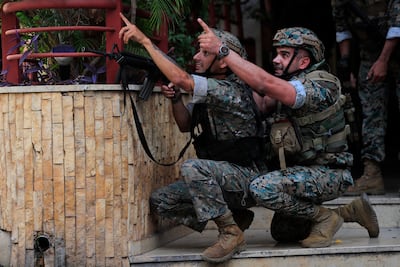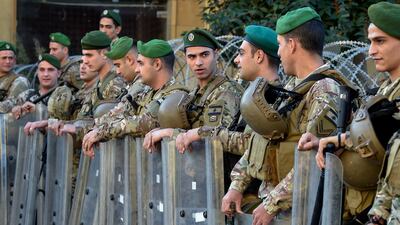A centrepiece of continuing western efforts to stave off a full-blown war between Israel and Lebanon has been to push for the Lebanese Armed Forces (LAF) to replace Hezbollah along the country’s southern border.
After Hezbollah’s patron, Iran, carried out direct drone and missile attacks against Israel this month, the onus to pacify Lebanon’s southern border and prevent a regional conflict has only become more acute.
However, the western peace approach, led by Washington, is very much tongue-in-cheek. Washington and the West know all too well that without a regional political solution the last thing Hezbollah will do is cede even an inch of its southern stronghold. What is less appreciated, though, is that bankrolling the LAF without truly reforming it risks forever perpetuating Lebanon’s military dualism, whereby Hezbollah’s military wing operates autonomously from the national army.
Institutional bloat, accusations of graft and political infighting have rendered the LAF highly dysfunctional, with little capacity to secure the country at large, let alone one of the world’s most volatile borders.
Western countries should be pushing for reforms necessary to make the LAF a viable national security institution instead of pushing the army to take up tasks it has little capacity to fulfil. And they have the leverage.
As the LAF’s largest international donor, the US has provided more than $3 billion in financial assistance since 2006, as well as most of the army’s aircraft, vehicles and military equipment.
Last year, an LAF salary support project funded by the US and administered by the UN Development Programme, kept the army corps from completely collapsing. And in March, the US congress approved another $150 million in assistance to the LAF, which will constitute almost a quarter of the Lebanese defence budget for 2024.
This aid is part of a long history of Washington, among other western allies, throwing money and other aid at the LAF with little concern or accountability over where it is spent. To continue providing this support, without conditioning it on a reform programme, would mean allowing a crippled institution to keep stumbling, leaving both Lebanon and regional stability at risk. What’s worse, allowing the LAF to lumber on without deep institutional reform provides ammunition to those who would like to defund the LAF, not least of all, some Republicans in the US.
The LAF regularly receives plaudits for being the only multi-sectarian institution respected by all sides in Lebanon’s otherwise deeply fractious and, at times, violent political landscape. The army is often seen as the last buttress between social stability and renewed civil war. Indeed, the LAF regularly conducts the business of a police force, fighting drug smuggling, human trafficking and engaging in border security. The LAF is also the country’s largest employer and social safety net, with 80,000 active service members and 400,000 beneficiaries.
Yet, at the behest of Lebanon’s venal political class, the LAF is also instrumentalised to – often with violence – break protest movements the establishment has not condoned or views as a threat to its hegemony. Last year, the LAF started forcibly evicting Syrian refugees, something that stopped the moment Washington got involved. Moreover, based on some of Lebanon’s draconian defamation laws, military courts can intimidate and try civilian journalists and comedians.
The underlying irony of all this is that while singing its plaudits and empowering the army, Lebanon’s political class (including Hezbollah) proclaim the need for the army to play a central role in defending the nation against external threats (read: Israel). What these accolades overlook, however, is that the army is never permitted to reform, lest it actually evolve into an institution that isn’t used by both the West and Lebanon’s political class for their own purposes.
Core to the army’s challenges is the scant transparency and oversight mechanism for its finances. In recent years, several corruption scandals have implicated senior army personnel. Transparency International has deemed Lebanon’s defence institutions at “very high” corruption risk.
The military bodies that try corruption cases – such as the Defence Committee to Combat Corruption and Military Capacity Development Office – suffer from the same opaqueness they were created to address.
The 2017 Public Annual Finance Review – the last published – provides no breakdown of the defence budget, while off-budget military spending is rampant. Meanwhile, no long-term parliamentary oversight exists for LAF spending, policies, or decisions. In total, some 70 per cent of defence spending goes to salaries and benefits, though skewed to favour the top. In 2021, there were as many as 400 general-grade officers serving, where official command structure mandates call for only 160.

These positions include large salaries and many perks, including private vehicles and attendants. And Lebanon’s politicians have an interest in keeping it this way. Sectarian patronage networks facilitate similar bloat throughout the LAF officer corps and general cadres. Appointments and promotions are highly politicised, with sectarian affiliations often coming before merit, entrenching external political loyalties in the top-heavy command structure. Decision-making responsiveness and effectiveness consequently suffer.
These dynamics have been laid bare since the 2019 economic collapse when the average value of a soldier’s take-home earnings fell from $800 pre-crisis to some $50 by 2023, forcing many to seek secondary employment and even consider desertion. In February, Lebanon’s Minister of Defence, Maurice Sleem, blamed LAF troops’ lack of combat readiness on the demoralising effect of low salaries.
It is this context in which western funding, and unused leverage needs to be understood, especially in light of plans to see the LAF assume greater control over the south of Lebanon. Western aid started to flow to the LAF in earnest following the 2006 Lebanon War. Subsequent aid to the LAF was part of a US strategy to incrementally offset Hezbollah’s military power and, by proxy, mitigate Iran’s regional influence.
Along with that of other western donors, this financial aid, supplied with few conditions or oversight, has led the LAF to continue dysfunctionally, while parts of its budget dissolve into patronage appointments and officer perks, perpetuating its incapacity.
For the army to truly be able to fulfil its national security responsibilities, multifaceted financial accountability measures are needed. These involve comprehensive audits, increased oversight, and legal and institutional reforms. A review and reform of the sectarian-based recruitment and promotion process, from entry-level soldiers to the officer corps, is key to gradually mitigating its abuse.
Parliamentary scrutiny of LAF processes must be normalised, military courts should try members of the military, not the public. Hiring freezes and early retirement programmes should be implemented to gradually reduce payroll bloat.
Without such reforms, there will come a day when the voices looking to defund the LAF will become louder and more salient. Without the LAF, Lebanon would truly lose its last nationally respected institution, not to mention all the security apparatus that provides internal security to the Lebanese.
Instead of letting this happen, Washington and its western allies should first be advocating for the reforms necessary to make the army a nimble and able national security institution. It’s time for Washington, and those who want an LAF that is fit for duty, to put their mouth where their money already is.


